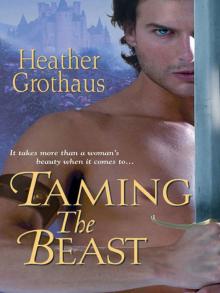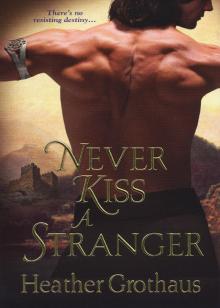- Home
- Heather Grothaus
Constantine Page 5
Constantine Read online
Page 5
“I can assure you they are,” she snipped. How dare he charge in here and assume ownership of everything?
“Then perhaps there is something I can do to shore up the passage.” He opened the door and was gone in the next moment.
Dori turned and looked about, but there was nothing with which to occupy herself in the Spartan oratory where the Gerard family had once taken their daily chapel in private. Thankfully, it wasn’t as Spartan as a commoners’ chapel, else she would have had nothing to survive on. The rich altar cloths, the golden receptacles for the host, the cache of wide candles and their stands had meant the difference between life and death for Dori.
She sat down on the edge of the bench and waited, her fingers twisted together on her lap, her eyes on the thin layer of grime covering the stone floor.
She didn’t know how long he was gone—perhaps a half hour. But when he returned he carried on his back the worn satchel she’d spied from the wall walk. He went to an empty stand in the corner of the oratory and affixed the candle to it, doubling the light in the clammy room and seeming to warm it at once.
“Do you not keep a fire?” he asked in an emotionless tone as he dropped an armful of slender sticks before the tiny hearth and then went at once to the table to place his bag upon it.
“Not every night,” she said, unable to keep her seat as she saw him withdrawing food from the satchel. “Only when it is very cold, and well after midnight. Even then, I only burn small amounts of twigs and straw.”
He glanced up at her as he placed a short, cloth-wrapped cylinder on the table. “You fear someone from the village will see the smoke?”
Dori nodded. “What’s that?”
“A bit of sausage.” He picked it up and undid the string, pulling the cloth back and holding it toward her.
She snatched it from him, her mouth running with saliva. “A knife,” she said curtly. “You made me leave my—” The dull metal glinted in the candlelight as he held the broken blade toward her. She took it and immediately turned back to the cot, walking toward it even as she sliced off a thick disk of the fragrant meat. She delivered it to her mouth with the knife and closed her eyes as she chewed.
Dori sat on the edge of the bench and did not look at him as she quickly worked her way through the short length.
“How long has it been since you’ve had a meal?” Lord Gerard asked.
She paused and swallowed, her eyes still on the last puckered end of sausage in her hand. “Forty-eight days,” she said before placing the bite in her mouth and then raising her face.
He was standing at the table still, a small piece of what appeared to be cheese in his hand. He glanced down at it and then back at her and tossed the wedge.
Dori snatched it out of the air as expertly as a swallow on the wing. The first bite was heavenly. She looked back up at him as she chewed, daring him to feel sorry for her.
“Your husband thinks you’re dead,” he said instead. “Why?”
“Because he ordered someone to have me killed after I gave birth to my son,” she said matter-of-factly, slicing off another piece of cheese. “As far as everyone at Thurston Hold and elsewhere knows, I bled to death in my childbed.” She tried not to dwell on the fact that that fate had actually nearly occurred.
“Why would he want you dead?” Lord Gerard pressed.
“He’s gotten what he wanted from me—an heir, a title, an estate. I was far too disobedient to be a suitable wife for him, especially now that I know so much of the animal he is, the dreadful things he’s done. I’m certain he’s now the heartsick widower, left to bravely raise an infant on his own.” She gave a sarcastically sad pout before popping the last bite of cheese into her mouth.
She continued after she swallowed. “Well, not entirely on his own; there’s Eseld. She’s the one who was responsible for poisoning me for months. And Felsteppe’s devil’s-spawn priest. Simon.”
“Your father—he’s dead now, I suppose.”
Dori stilled, licked the last taste of salt from her lips. “More than a year.” She glanced at his now deflated satchel and then back into his face. “Have you anything else?”
He shook his head. “I’ll go fishing in the river on the morrow.”
“You’ll help me rescue my son, now you’re here,” she said, not daring to pose the phrase as a question.
Constantine Gerard stared at her for a moment, and his green eyes were glittering, cold, nearly as cold as his tone when he spoke. “You must forgive me for my lack of enthusiasm for rescuing a child belonging to the man who killed my wife and my own son in the very rubble we now occupy. Frankly, Lady Theodora, I couldn’t care less what happens to your ill-gotten offspring.”
“You’d better,” she said, looking him up and down, “if you ever hope to have your lands restored to you.”
“What are you talking about?” Lord Gerard demanded.
“Glayer Felsteppe is petitioning Henry to purchase Benningsgate Castle. He’s been at it for months now. You’re quite behind in your taxes, Lord Gerard.” The man’s jaw flinched as he stared at her but said nothing, so Dori continued, her heart pounding as if it would leap from her chest. “If you should be successful in your mission to see him dead, you’ll have murdered a peer. If Felsteppe has purchased your lands, without proof of his treachery to justify your actions, Benningsgate will never revert to you. It will instead fall to . . .” She let the thought trail away.
“Felsteppe’s heir,” he finished, seemingly through clenched teeth. “I don’t care, though. My whole purpose in returning to England was to kill Glayer Felsteppe. I don’t care what happens to Benningsgate afterward. I don’t care what happens to me.”
She was nodding, her thoughts turning quickly in her head as she thought of something to say. “I understand. And there is no one else on earth who also wants to see Glayer Felsteppe dead as badly as I. But is that the legacy you wish to leave?” She affected a common accent. “ ‘Oh, aye—that poor boy what burned up in Benningsgate—a mercy, really. You know his father died a murderer and a traitor.’ ”
“I’m not a traitor,” Lord Gerard growled.
Dori rose from the cot and walked toward the table to stand across from him. She trembled in furious panic and it made her words low, breathy. “If you kill Felsteppe before I can reach my son, I’ll never get him back. He’ll be taken away as a ward and Thurston Hold—and Benningsgate—will be held by the Crown. Glayer Felsteppe will have succeeded in taking everything. From both of us.”
He continued to stare at her so that Dori felt prickly chills race up her spine; she could see the hatred in his eyes.
“I know things about Felsteppe. Things he did in Jerusalem, people he killed, tried to have killed. My testimony could be the proof you need to ruin him forever. If you help me—”
“I don’t want him ruined—I want him dead.”
“The proof to justify your actions, then.”
His eyes narrowed. “Tell me now.”
Dori felt her eyebrows raise, and for the first time in months and months a genuine laugh bubbled at her lips. The sustenance must have made her giddy. “Oh, certainly. I’ll tell you everything I know so that you can kill him right off and be on your way.”
They stared at each other for a pair of moments before Lord Gerard spoke again. “What’s his name?”
Dori’s frown faltered. “I beg your pardon?”
“Your son; what is he called?”
Her throat constricted for just a moment. “Felsteppe had him christened Glander, I’m certain—he was set on it from the moment he learned I had conceived.”
“What would you have called him?”
“It doesn’t matter now, does it?” she said, folding up the cloth and the strings from the food. Who would her son be, if she ever got him back? Who would she be? She raised her face suddenly.
“William.” When Constantine looked at her she lifted her chin. “I would have called him William.”
He took the folded s
quares of cloth bundled with the string from her and returned them to his satchel. He cinched the bag and then looked back at her. “At the very least, you must tell me how it is that you came to be married to Glayer Felsteppe; I cannot fathom your father allowing you to wed such a monster.”
Dori felt her back stiffen and she turned from him, moving to the cot to straighten her coverlet. “I think I’ve allowed you enough liberties for the evening. Especially considering you’ve beaten me. I don’t owe you anything.”
“I believe you’ve more of my blood on your hands than the other way ’round. I have fed you. And in principle, you’re living in my house. Call it a tax.”
Dori spun around to fix him with a glare. “Yes? Well, arrest me or shut up.”
She thought she saw the corner of his mouth twitch. He grabbed up his bag and slung it over his shoulder before moving toward the door.
“Where are you going?” she demanded.
Lord Gerard paused, bending to pick up the discarded stake and toss it to Dori. “I’ll find shelter elsewhere on the grounds. Good night, Lady Theodora.”
He pulled the door shut after himself, leaving Dori standing near the cot. The oratory looked just the same as it had before he’d come and yet nothing was the same.
Constantine Gerard had returned.
Chapter 5
Constantine finished lacing the gutted fish onto the slender pike he’d whittled, then stabbed the end of the stake into the dirt before rising from his crouch and collecting his satchel and fishing supplies. The morning sun was at last beginning to warm the ground, and the air grew humid as the bright rays streamed through tree branches thickening with greenery by the moment, it seemed.
He stopped and looked across the peacefully flowing river, its surface sparkling so brightly with silver that he had to squint. His river. His lands. He glanced over at the breakfast he’d procured for himself and Theodora Rosemont.
His fish.
None of it meant a damn thing anymore.
He pulled the pike from the mud of the bank and turned to scale the steep hill below Benningsgate. The smoke from the small fire pit he’d built the night before still curled weakly, showing up in bright relief against the ragged, dark skirts of the woman who stood behind it.
“Could you see the smoke?” he said by way of greeting as he came upon his makeshift camp. He’d prefer not to draw the curiosity of whatever villagers were left below the castle ruins just yet.
Theodora shook her head. “I only smelled it once I was outside the wall. Did you sleep out here all the night?”
Constantine jabbed the staff into the soft dirt again before shrugging out from beneath his satchel and then dropping to his knees to remove the topmost cedar boughs from the fire. Greenery smoldered atop the rocks in the center of the shallow pit.
“I’ve grown used to sleeping out of doors,” he said as he reached behind himself and pulled up the stake of fish. He brought the pole in front of him to lay it across the hot rocks. “It’s fair this time of year.”
“It’s cold,” Theodora argued.
“It’s warmer here than Bavaria in winter,” he rejoined.
“I wouldn’t know.” Theodora swept her hands beneath her seat before squatting on her heels near the warm smoke, stretching out her pale, knobby fingers as Constantine replaced the cedar boughs.
He looked across the pit at her. “Admittedly, not as warm as Jerusalem.”
Her eyes flicked up at him, but she made no comment, and as the sunlight fully revealed the raggedness of her costume, the frailness of her person, Constantine did not press the subject. Her slender neck seemed to be nothing but cord and bone, the hollows at her temples and cheeks deep, the skin covering the undersides of her wrists the palest blue.
Theodora Rosemont was clearly unwell.
“I never wished to wed Glayer Felsteppe,” she said suddenly, and although Constantine continued to watch her, she did not raise her eyes to him again. “I hated him from the moment I saw him. I begged my father to retract the betrothal.”
“What I cannot fathom,” Constantine challenged, “is why your father would have entertained the agreement at the first. Glayer Felsteppe was no match for a woman of your station.”
“Not so,” Theodora argued mildly, turning her hands in the warming smoke. “He had returned from the Holy Land a hero, with letters to recommend him. He was lauded as the man intent on chasing down the traitors of a besieged Christian fortress. His reputation was that of a champion. A warrior who held great favor with the crown.”
Constantine’s frown deepened. “Your father could not have known the man’s character, and yet he bound his only daughter to him? Was willing to bequeath Felsteppe Thurston Hold and his life’s work on the word of speculation and gossip?”
“You’ve been gone many years, Lord Gerard. My father had been . . . deteriorating in health for some time,” Theodora hedged. “I’m sure you know by now how ingratiating Felsteppe can be to those he thinks to profit from. My father was becoming unable to tell the difference between reason and fantasy. Any matter,” she looked up at him, then, “I’m certain much the same was said about another lord father when you became betrothed to Lady Patrice. It was through your marriage that you received the earldom of Chase, was it not?”
Now it was his turn to drop his eyes to the fire, realizing the wisdom in Theodora’s comparison, if the details of the things were vastly different.
“Patrice’s father was not ill. And she and I were agreeable to the arrangement.”
“A love match, was it?” Theodora pressed, and he could hear the needling challenge in her voice.
“There are varying degrees of love.” Constantine felt his face heating, remembering the tearful confessions, the humiliation of the blatant indiscretions, Patrice’s beautiful, bewildered face begging him for forgiveness.
“Hmm.” She sighed thoughtfully. And then, “I was at Thurston Hold a week ago. I overheard that Felsteppe planned to journey to London with Eseld and the baby soon.” She leaned down even lower to pick at the end of a bough, peek beneath it, releasing a wave of white, fragrant smoke. “Perhaps they are returned by now.” She dropped the bough and looked back up at him expectantly.
“How many times have you been back?” he asked.
She hugged her knees, narrow and knobby-looking beneath her dirty, threadbare skirts, and now she met his gaze directly. Her rich, dark hair—Constantine could remember the noble ladies’ admiration of the long, thick, shiny locks when Dori was still a child—feathered out around her face like the dark whirls of a new lamb’s wool. The black sheep. Yes, that was fitting for Theodora Rosemont.
“Three,” she answered. “I wasn’t well enough to make the journey for nearly a month after I first came to Benningsgate.”
“You don’t appear to be well enough for it now,” he commented, not caring if it offended her, but by her smooth face and the unchanged line of her wide mouth it did not. “Why did you not procure supplies and food from Thurston?”
She shook her head, and Constantine was momentarily struck by the thought that her cropped hair somehow enhanced the feminine look of her face, rather than given her the appearance of a young boy.
“I can’t risk being caught. The servants who are left have no choice but to be loyal to Felsteppe. I risk my life each time I step but a foot onto Thurston Hold lands.” She glanced at the smoking vegetation. “How long until we can eat?”
“A bit,” Constantine said. “I find it difficult to believe that you’ve managed not only to survive on your own this long at Benningsgate with no food but you’ve also made the lengthy journey to Thurston Hold on foot three times.”
Theodora rested her chin on her knees, then, and dropped her gaze to the fire. “I managed to take some barley from the stables twice. Last time I found some shriveled roots that were to be given to the pigs. I warmed them in some water in the chalice. I’ve tried catching fish to no avail. The handful of people living in the village here h
ave so little themselves that it is guarded closely. Now that spring has come, there will be more to forage.”
Constantine felt a strange sensation in his middle, thinking of how impossible it was that this young woman had survived until now. A forced childbirth, sheltering in a forsaken ruin, no food, little warmth. Such circumstances would have laid many a mighty soldier down.
He observed that she was starved, cold, her skin holding a bluish tinge. Even her nail beds beneath the jagged dirty crescents of her nails were purpled. While the fish she would soon consume would do much to alleviate her immediate hunger, what she truly needed was rich food, a warm bed, and, likely, a potion.
But then he remembered that she was no longer the celebrated miss of Thurston Hold, the light of her father’s eye, the delicate if outspoken angel with the long, twisting locks of dark hair. She was Glayer Felsteppe’s wife, and she had borne his child.
Christian was dead because of this woman’s husband. And no matter how frail she appeared, no matter what she had endured, although she might not be Constantine’s enemy, he certainly didn’t trust her enough to consider her his ally. Theodora Rosemont’s troubles were her own as far as he was concerned.
She looked up at him suddenly, caught him watching her. His expression must have conveyed his distrust of her, for her own brows twitched downward, her gaze hardened. Theodora didn’t consider him a friend either.
“When do we depart?” she asked.
“We aren’t going anywhere,” Constantine said, looping the long strap of his satchel over his head and standing. Theodora gained her feet as well. He met her eyes. “I made a promise years ago; the next time I see Glayer Felsteppe, I will kill him. And nothing or no one will stop me. Not you, not your child, not the king. When I go to Thurston Hold, it will be to see Felsteppe dead, not to play the gallant.” He turned and strode down the slope toward the wood.
“Where are you going?” she called after him. “Lord Gerard?”
Constantine did not answer her.

 The Highlander's Promise
The Highlander's Promise The Laird's Vow
The Laird's Vow The Scot's Oath
The Scot's Oath Taming The Beast
Taming The Beast Never Seduce A Scoundrel
Never Seduce A Scoundrel Roman
Roman Never Love a Lord
Never Love a Lord Never Love a Lord (Foxe Sisters)
Never Love a Lord (Foxe Sisters) Valentine
Valentine Adrian
Adrian Constantine
Constantine Never Kiss A Stranger
Never Kiss A Stranger